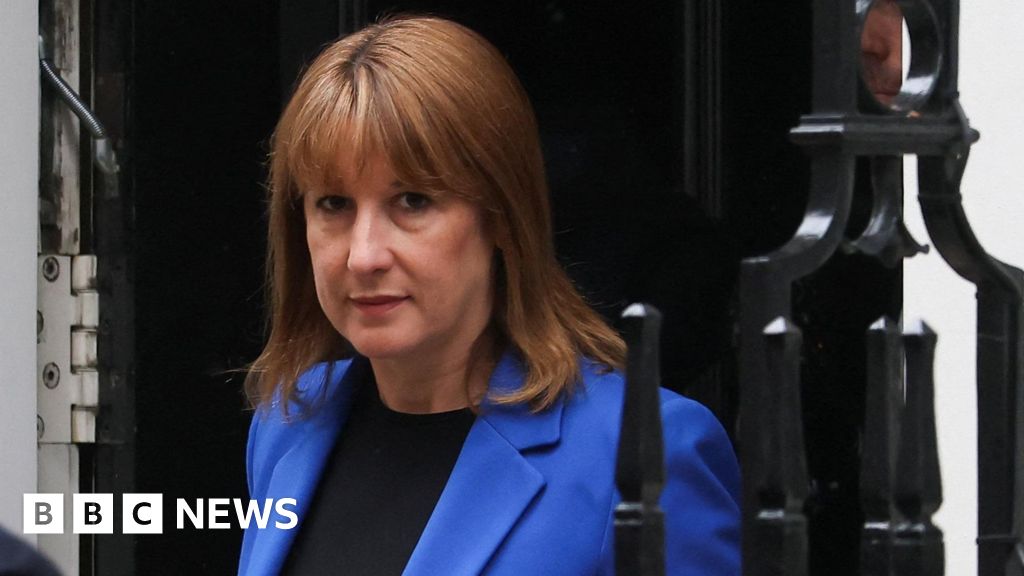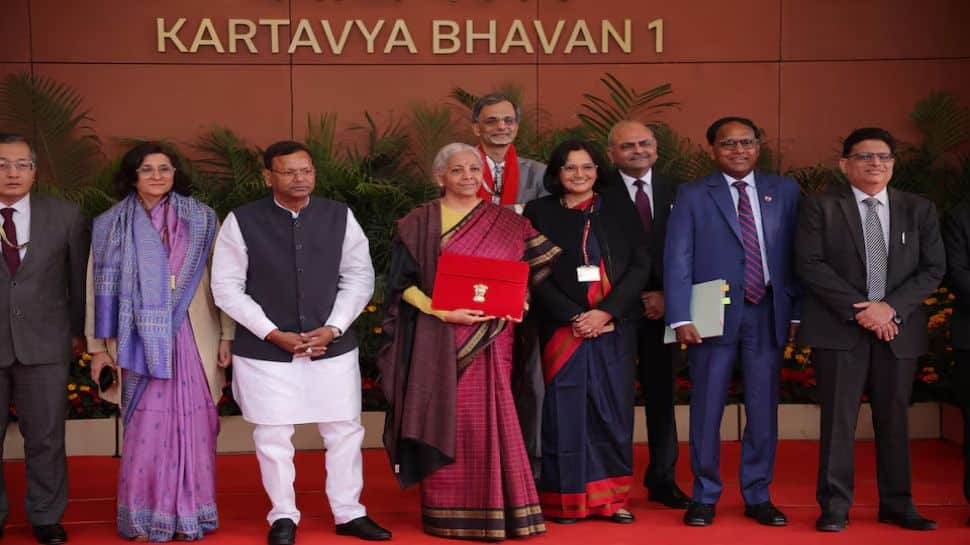Business
UK borrowing costs hit 27-year high adding to pressure on Reeves

Tom Espiner & Nick EdserBusiness reporters, BBC News
 Reuters
ReutersUK government borrowing costs have reached their highest level since 1998, adding to the pressure on the chancellor ahead of the Budget.
The interest rate on 30-year government bonds, known as the yield, jumped to 5.698%, making it more expensive for the government to borrow money.
There are rising expectations that Chancellor Rachel Reeves will increase taxes in the Budget later this year in order to meet her borrowing and spending rules, as worries grow about the state of the government’s finances.
On the currency markets, the pound also fell more than 1% against the dollar on Tuesday.
Sterling dropped to $1.3379, which is the lowest level against the US currency since 7 August.
The UK was not alone in seeing borrowing costs rise, with yields on 30-year German, French and Dutch bonds climbing to their highest 2011.
A number of factors have led to borrowing costs for governments around the globe to go up, such as geopolitical tensions, US President Donald Trump’s trade policies and the upcoming confidence vote in the French government.
‘Difficult choices’
But Susannah Streeter, head of money and markets at Hargreaves Lansdown, said the chancellor faced “highly difficult choices” in the Budget and that she had been “dealt a warning” by investors.
“They are selling off UK government debt, clearly concerned that the government may be losing its grip on the public finances,” she said.
In its manifesto, Labour promised not to raise taxes such as income tax, VAT or national insurance on “working people”. This has led to much speculation over what taxes Reeves could raise in the autumn Budget.
One option suggested is that the freeze on income tax thresholds, which is due to end in 2028, could be extended.
Often referred to as a “stealth tax”, freezing income tax thresholds means that, over time as salaries rise, more people are dragged into paying higher rates.
There have also been reports that Reeves is considering reforming property taxes.
“With so many options for raising taxes being bandied about during the summer, there appears to be concern that the decisions made might not be sufficiently thought through,” said Ms Streeter.
“The worry isn’t just that government coffers won’t be replenished, but that they will be filled at the expense of growth, leading to a vicious circle emerging.”
On Monday, the government announced a partial reshuffle, with Darren Jones, formerly Reeves’s deputy, being given a key No 10 role by the prime minister.
The changes are focused on beefing up the economic know-how in Downing Street. Baroness Shafik, a former deputy governor of the Bank of England, has been named at Keir Starmer’s new chief economic adviser.
The moves are a recognition that the upcoming autumn’s Budget will be a defining moment in this Labour government.
Governments borrow money from investors by selling bonds – which is a loan the government promises to pay back at the end of an agreed time.
The yield on 30-year UK government bonds – known as gilts – has been rising for some months, and this makes it more expensive for the government to borrow money due to higher interest payments.
The government’s official forecaster, the Office for Budget Responsibility (OBR), takes borrowing costs into account when looking at whether the chancellor is meeting her self-imposed fiscal rules.
When she became chancellor, Reeves set out two rules on government borrowing, which she has repeatedly said are “non-negotiable”. These were:
- day-to-day government costs will be paid for by tax income, rather than borrowing by 2029-30
- to get debt falling as a share of national income by the end of this parliament in 2029-30
Part of the reason Reeves is under pressure is that her financial buffer to stick to these rules is a relatively slim £10bn. The chancellor recently refused to rule out tax rises after disappointing data on economic growth.
On Tuesday, a spokesperson for Starmer said the government’s “iron-clad commitment to our robust fiscal rules remains”, adding it had made the necessary decisions to “stabilise the public finances”.
But shadow chancellor Mel Stride said the latest market movements were “another economic disaster from Rachel Reeves – and a clear vote of no confidence in Labour from the markets”.
“With more tax rises on the horizon, the economy is now in a precarious position,” he added.
There has been a wide range of forecasts for how much money Reeves might need to raise in the Budget to meet her rules.
One factor that will influence this is the borrowing costs facing the government.
When the OBR makes makes its forecasts for government debt it looks at yields on all bonds.
Paul Dales, chief UK economist at Capital Economics, said concerns about the path of UK inflation and interest rates, combined with global issues, were pushing UK government borrowing costs up.
In addition, he added that pension funds were also not buying as much long-term government debt due to the change in recent years from defined-benefit to defined-contribution schemes.
Mr Dales said Reeves would have to raise between £18bn and £28bn in the Budget to avoid breaking her fiscal rules, and to maintain her £10bn buffer.
Households and banks “will probably feel the brunt of the higher taxes”, he said.
Business
India’s $5 trillion economy push: How ‘C+1’ strategy could turn country into world’s factory

New Delhi: India is preparing for a major economic transformation. The Union Budget 2026-27 lays out measures that could make the country the top choice for global manufacturing using the popular ‘China +1’ (C+1) strategy. This comes as international companies rethink supply chains after COVID-19 disruptions, rising trade tariffs and geopolitical tensions.
India has positioned itself as the backup factory for the world that is ready to absorb international demand in case of any crisis in China or Taiwan.
The government has offered tax breaks for cell phone, laptop, and semiconductor makers, making India more attractive to foreign investors. Reducing bureaucratic hurdles for global firms, the budget also strengthens the National Single Window System to simplify business procedures. The message is clear: India is ready to step in as a global manufacturing hub, ensuring supply continuity for the world.
The expressway to a $5 trillion economy
China presently dominates about 40% of global manufacturing. Its factories supply critical products worldwide, but 2026 is expected to be a turning point. Expanding influence and economic opacity have made global companies seek alternatives.
India has leveraged this moment, offering a comprehensive incentive package for foreign manufacturers. Analysts call it more than policy; it is a blueprint to become a $5 trillion economy and reclaim India’s historic position as a global industrial leader.
Why the world needs India now
The COVID-19 pandemic exposed the dangers of over-reliance on a single supplier. When China halted medical exports, nations realised the need for diversified supply chains. Major companies such as Apple and Samsung now see India as a dependable alternative.
China’s aging workforce and rising labour costs further enhance India’s appeal. With 65% of its population under 35, India offers a vast, skilled and affordable workforce for decades. The geopolitical uncertainty surrounding Taiwan, which produces 90% of advanced chips, has also created demand for a secure manufacturing backup. India is stepping in to fill that gap.
How India stands to gain from China’s challenges
India’s budget, 2026-27, slashes import duties on cell phone and laptop components, turning the country into a hub for component manufacturing, not just assembly. Electronics exports are projected to cross $120 billion by 2025.
The government has also launched a Rs 1.5 lakh crore semiconductor mission, attracting companies like Tata and Micron to establish advanced chip plants in India. In the chemical sector, stricter environmental regulations in China have shut down several plants, benefiting Indian companies such as Privi Specialty and Aarti Industries, which are now filling gaps in global supply chains.
Incentives for companies
The Production Linked Incentive (PLI) scheme promises cash rewards for output, covering over 14 sectors. This is India’s answer to Chinese subsidies. From land acquisition to electricity connections, the National Single Window System now enables businesses to clear all approvals through a single portal.
Infrastructure investment has also received a massive boost, with Rs 11.11 lakh crore allocated under PM GatiShakti. New ports and dedicated freight corridors are being built to ensure that exports from India reach the world faster and cheaper than ever before.
India’s moves points to a strategic shift in global manufacturing. By rolling out the red carpet for foreign companies and investing heavily in infrastructure, technology and policy reforms, the country is poised to become the go-to destination for global supply chains. The C+1 formula is not only a concept; it is a roadmap to turn India into the next industrial superpower and a $5 trillion economy.
Business
D-St blues! Sensex sheds 1.5K, biggest drop on a Budget day – The Times of India

At a time when global markets are witnessing high volatility due to geopolitical uncertainties, the hike in securities transaction tax (STT) on derivatives trades hit investor sentiment on Dalal Street on the Budget day. This in turn led to a sharp sell-off that pulled the sensex down by nearly 1,500 points—its biggest points loss on a Budget day—to close at 80,773 points. The sell-off also left investors poorer by Rs 9.4 lakh crore, the biggest Budget day loss in BSE’s market capitalisation.The day’s trading was marked by high volatility. The sensex rallied over 400 points as FM started her speech, fell about 1,100 points after the STT hike proposal was announced, partially recovered by mid-session to trade 600 points down on the day and then sold-off to close below the 81K mark for the first time in four months.On the NSE, Nifty too treaded a similar path to close 495 points (2%) lower at 24,825 points. Fund managers and market players feel the day’s sell-off was overdone, compounded by the absence of most institutional players since it was a Sunday. “The market’s reaction (to the hike in STT rates) was a bit overdone, although the decision itself was unexpected,” said Taher Badshah, President & Chief Investment Officer, Invesco Mutual Fund. “I think markets should settle down in 2-3 days.” Badshah said the Budget was in line with govt’s set path of the past few years, showing a conservative approach to setting targets.“The revenue and expenditure targets for FY27 are achievable. And since the rate of inflation is lower now, the nominal GDP growth rate of 10% may turn out to be on the higher side as inflation normalises during the year,” the top fund manager said. In Sunday’s market, of the 30 sensex stocks, 26 closed in the red. Among index constituents, Reliance Industries, SBI and ICICI Bank contributed the most to the day’s loss. Buying in software services majors Infosys and TCS cushioned the slide. In all, 2,444 stocks closed in the red compared to 1,699 that closed in the green, BSE data showed.STT hike aimed at curbing F&O speculation The decision to raise securities transaction tax (STT) for trading in equity derivatives means trading futures & options (F&O) will be more expensive from April 1. STT on futures trading rises from 0.02% to 0.05% now, and on options premium and exercise of options to 0.15% from 0.1% and 0.125% respectively. This could more than double statutory costs of trading F&O contracts.While the move is to curb excessive speculation by retail traders who mostly suffer losses, investors sold stocks of those companies that derive a large portion of their turnover from this segment. Stock price of Angel One crashed nearly 9%, BSE crashed 8.1%, Billionbrains Garage Ventures that runs the Groww trading platform, lost 5.1% and Nuvama Wealth Management lost 7.3%. STT hike follows a Sebi survey that showed that 91% of the retail investors lost money in the F&O market with average loss per investor surpassing Rs 1 lakh per year. Institutional and some high net worth players took home most of the profits from the segment.18% GST on brokerage for FPIs removedThe Budget proposed to do away with 18% GST charged on the brokerage that foreign portfolio investors pay in India. Among the host of changes to the GST laws that the finance minister proposed, one was abolishing clause (b) of sub-section (8) of section 13 of the Integrated Goods and Services Tax Act, 2017. This is being “omitted so as to provide that the place of supply for ‘intermediary services’ will be determined as per the default provision under section 13(2) of the IGST Act,” the Budget proposal said.
Business
Buying property from NRIs? Time to lose the TAN – The Times of India

Buying property from an NRI? Worried about obtaining TAN? Not anymore. To relax the compliance burden, the Budget has proposed that resident individuals and HUFs need not have a Tax Deduction and Collection Account Number (TAN) if they are purchasing a property from a non-resident Indian (NRI). The amendment will take effect from Oct 1, 2026.Under the proposed framework, resident individuals or HUFs can report the tax deducted at source (TDS) by quoting PAN, as is done when the transactions are between two residents. Presently, if a person buys an immovable property from a resident seller, the person is not required to obtain TAN to deduct tax at source. However, where the seller of the immovable property is a non-resident, the buyer is required to obtain TAN to deduct tax at source.Ameet Patel, partner at Manohar Chowdhry & Associates, said this used to be a detailed process. “At present, if a resident were to purchase an immovable property from an NRI, there is no separate relaxation regarding compliance with TDS responsibilities. As a result, in such cases, the buyer needs to obtain a TAN, register on the portal, and then deduct TDS u/s. 195, and pay to the govt. Under section 195, as with all other regular TDS sections, a quarterly e-TDS statement is required. A buyer would need professional help for all this.”Hinesh Doshi, CA, welcomed the move. “There used to be an unnecessary compliance burden due to this. While the process to obtain TAN is simple, people used to obtain TAN for just one transaction. So, this is a good riddance.”
-

 Sports6 days ago
Sports6 days agoPSL 11: Local players’ category renewals unveiled ahead of auction
-

 Entertainment5 days ago
Entertainment5 days agoClaire Danes reveals how she reacted to pregnancy at 44
-

 Tech1 week ago
Tech1 week agoICE Asks Companies About ‘Ad Tech and Big Data’ Tools It Could Use in Investigations
-

 Fashion1 week ago
Fashion1 week agoSpain’s apparel imports up 7.10% in Jan-Oct as sourcing realigns
-

 Sports5 days ago
Sports5 days agoCollege football’s top 100 games of the 2025 season
-

 Business6 days ago
Business6 days agoBanking services disrupted as bank employees go on nationwide strike demanding five-day work week
-

 Fashion1 week ago
Fashion1 week agoAustralian wool prices climb again as exporters drive demand
-

 Politics5 days ago
Politics5 days agoTrump vows to ‘de-escalate’ after Minneapolis shootings





